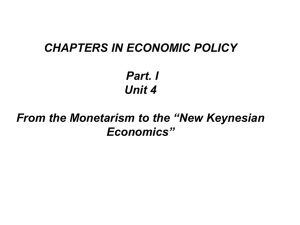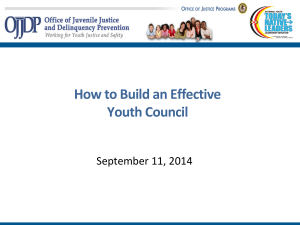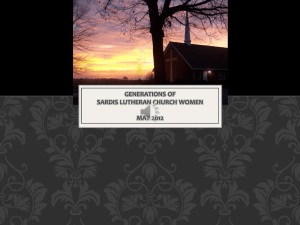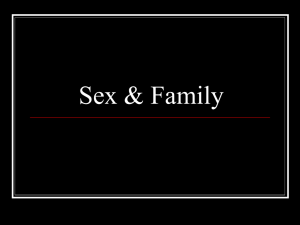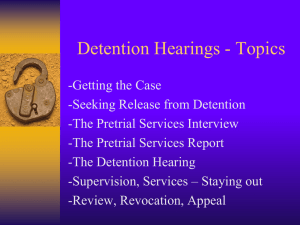lecture 9 the family and crime
advertisement
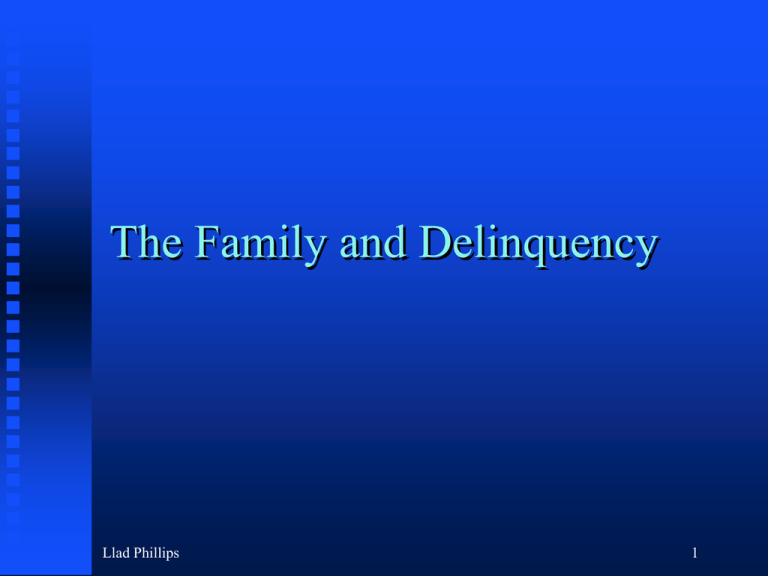
The Family and Delinquency Llad Phillips 1 The Family and Delinquency What is the role of the family in causing or preventing delinquency? How important is the family in considering possible causes of delinquency? Llad Phillips 2 The Importance of Causality A theme in this course Llad Phillips 3 Schematic of the Criminal Justice System Causes ?!! “T he Driving Force” Weak Link Offense Rate P er Capita Crime Generation Expenditures Crime Control Reference: Lecture Six Expected Cost of Punishment (detention, deterrence) Reference: Lecture Four California Index Expenses and Criminal Justice System . Expenditures, Both Per Capita, 1967-68 to 1997-98 . 600 1997-98 1992 $ Per Capita 500 400 1980-81 300 1967-68 200 100 0 0 0.005 0.01 0.015 0.02 0.025 0.03 0.035 0.04 0.045 CA Index Offenses Per Capita Llad Phillips 6 California Index Offenses and Criminal Justice System . Expenditures, both per capita, 1967-68:1992-93 500 450 199 2-93 400 1992 $ Per Capita 350 300 198 0-81 250 200 196 7-68 150 100 50 0 0 0.005 0.01 Reference: Lecture Six 0.015 0.02 0.025 Index Offenses Per Capita 0.03 . 0.035 0.04 Social Institutions Shaping Youth Education System Family Llad Phillips Community 8 Viewpoints About the Family and Delinquency Travis Hirschi: a weak child-parent bond or attachment explains delinquency(1969) Joseph Rankin: homes with both biological parents missing explains running away, truancy, and auto theft(1983) Sheppard Kellam, M. Ensminger, and R. J. Turner: Being raised by a mother alone explains delinquency(1977) Source: Glenn C. Loury, Ch 1 of Families, Schools, and Delinquency Prevention, eds. James Q. Wilson and Glenn C. Loury Llad Phillips 9 Trends Affecting Families Changes in Family Structure Llad Phillips 10 Marriage and Divorce Rates Per 1000 Population, US . 12 10 8 Marriages 6 4 2 Year Source: US Statistical Abstract 1992 1989 1986 1983 1980 1977 1974 1971 1968 1965 1962 1959 1956 1953 0 1950 Rate Divorces Marriage Rates Source: Center for Disease Control, CDC Llad Phillips 12 Number of Divorces and Children Affected Source: Center for Disease Control, CDC Llad Phillips 13 Age Specific Divorce Rates, men and Women Source: Center for Disease Control, CDC Llad Phillips 14 Divorce Rates by Duration of Marriage Source: Center for Disease Control, CDC Llad Phillips 15 US Marrige Rates Per 1000 Population, . Unmarried Women 15-44 Years Old 160 140 120 80 60 40 20 Year Source: US Statistical Abstract 1994 1992 1990 1988 1986 1984 1982 1980 1978 1976 1974 1972 0 1970 Rate 100 Median Age at First Marriage, US . 30 25 15 Women Men 10 5 Year Source: US Statistical Abstract 1990 1988 1986 1984 1982 1980 1978 1976 1974 1972 0 1970 Age 20 US Families Headed By Women in Percent . 45 40 35 White Black Percent 30 25 20 15 10 5 0 1940 1950 1960 1970 1983 Year Source: Glenn C. Loury, Ch 1 of Families, Schools, and Delinquency Prevention, eds. James Q. Wilson and Glenn C. Loury Post World War II Phenomenon “In 1925, approximately 85 perent of black families living in Harlem were intact, and the teenage mother raising her children alone was virtually unknown...” Source: Glenn C. Loury, Ch 1 of Families, Schools, and Delinquency Prevention, eds. James Q. Wilson and Glenn C. Loury Llad Phillips 19 Percentage of Births Occuring Out of Wedlock, . White Women by Age Group, US . 35 30 Percent 25 15-19 20-24 25-29 20 15 10 5 0 1955 1960 1965 1970 1975 1980 Year Source: Glenn C. Loury, Ch 1 of Families, Schools, and Delinquency Prevention, eds. James Q. Wilson and Glenn C. Loury Percentage of Births Occurring Out of Wedlock, . Black Mothers By Age Group, US 90 80 70 15-19 20-24 25-29 Percent 60 50 40 30 20 10 0 1955 1960 1965 1970 1975 1980 Year Source: Glenn C. Loury, Ch 1 of Families, Schools, and Delinquency Prevention, eds. James Q. Wilson and Glenn C. Loury Llad Phillips 22 Birth Rates for Unmarried Women By Age of Mother Source: Center for Disease Control, CDC Llad Phillips 23 Per Cent Low Birth Weight By Age of Mother Source: Center for Disease Control, CDC Llad Phillips 24 “The Rotten Kid Theorem” Reference: Jack Hirshleifer, “The Expanding Domain of Economics” Figure Llad Phillips 1 25 Daughter’s Income Father’s Income Llad Phillips 26 Daughter’s Selfish Preferences: UD = UD(YD) Daughter’s Income, YD Best Better Good Father’s Income, YF Llad Phillips 27 Daughter’s Income Llad Phillips Family Joint Income Opportunities When Both the Child and Parent Agree Father’s Income 28 Short-sighted selfish daughter prefers point R Daughter’s Income R Llad Phillips Father’s Income 29 Daughter’s Income Family Income = Daughter’s Income + Father’s Income Father’s Income Llad Phillips 30 Daughter’s Income Family Income Is Maximum At Point J R J Father’s Income How Does the Parent Induce the Selfish Child to Act in the Family Interest? Did King Lear Have It Right? Llad Phillips 32 Father’s Altruistic Preferences: UF = UF(YD , YF) Daughter’s Income Father’s Income Llad Phillips 33 Why Does The Parent Care For The Child? Darwinian (evolutionary) motive: survival of the genes Llad Phillips 34 Daughter’s Income A R If the father is sufficiently altruistic, then the daughter’s enlightened self-interest is to prefer point A, and she can be induced to behave in a cooperative way, allowing point J that leads to point A J Father’s Income If the father is insufficiently altruistic, then the daughter will prefer point R to point B and, as a result, family income and fortunes will be lower Daughter’s Income R B J Father’s Income So, Love, Not Greed, Makes the World Go ‘Round In what kind of environment does love and caring flourish? both biological parents are present educated, enlightened self-interest a family with enough time and resources to care for one another Llad Phillips 37 National Longitudinal Survey of Youth survey of 14-23 year olds self-report information about contact with the criminal justice system for -1979 ever stopped by the police ever charged with a crime ever convicted of a crime family income family structure when youth was age 14 Llad Phillips 38 National Longitudinal Survey of Youth (NLSY) 14-23 years of age Report: never stopped Report: ever stopped 28.5% Report: never charged Report: ever charged 17.4% Report: never convicted Report: ever convicted 10.1% NLSY: Family Structure, Age 14 Family Structure Frequency, % % Ever Charged Father-Mother 69.1 15.0 Mother-No Man 16.0 19.6 Mother-Stepfather 6.4 28.9 Father-Stepmother 1.8 12.4 Father-No Woman 1.3 22.6 Other Strucures 5.4 24.7 4,927 boys and young men, ages 14-23 Source: William Comanor and Llad Phillips, “The Effect of Family Structure on Teen Delinquency” Llad Phillips 40 NLSY: Family Structure, Age 14 Family Structure Frequency, % %, Ever Given Birth Father-Mother 66.5 3.5 Mother-No Man 18.8 10.6 Mother-Stepfather 6.8 7.1 Father-Stepmother 1.0 6.2 Father-No Woman 0.8 3.8 Other Structures 6.0 9.0 3119 girls and young women, ages 14-19, never married Source: William Comanor and Llad Phillips, “The Effect of Family Structure on Teen Delinquency” Llad Phillips 41 So, Love, Not Greed, Makes the World Go ‘Round In what kind of environment does love and caring flourish? both biological parents are present educated, enlightened self-interest a family with enough time and resources to care for one another Llad Phillips 42 The Importance of Social Institutions Family: social control; human capital School: social control; human capital Religious organizations: moral compliance Community groups and centers Llad Phillips 43 Question: Why are people violent? Before the agricultural societies in Mesopotamia and the Nile Valley, people were hunters and gatherers and shepherds and tended to fear strangers (And fight them) Paul Seabright, The Company of Strangers, A Natural History of Economic Life(2004) Princeton U. After people settled down as farmers they needed social institutions to help them interact with strangers Markets allowed people to deal productively with strangers Legal systems and governments allowed settlement of disputes Adam Smith; The Wealth of Nations(1776) “It is not from the benevolence of the butcher, the brewer, or the baker, that we expect our dinner, but from their regard to their own interest.” Llad Phillips 44 THE UNITED STATES CONSTITUTION We the People of the United States, in Order to form a more perfect Union, establish Justice, insure domestic Tranquility, provide for the common defence, promote the general Welfare, and secure the Blessings of Liberty to ourselves and our Posterity, do ordain and establish this Constitution for the United States of America Llad Phillips 45 What Leads to the Loss of Social Control? Llad Phillips 46 Social Control of Citizenry Civil law and authority First line of defense: moral compliance and good citizenship Second line of defense: deterrence (the threat of punishment) Third line of defense: detention Martial law and authority Fourth Llad Phillips line of defense: National Guard and the Army 47 100 % Percent Control Riot 99% 98% Martial Law Civil Law Moral Deterrence Compliance Llad Phillips Detention National Guard 48 Why Is the Imprisonment Rate So High in the USA? 0.74 % Llad Phillips 49 The U.S. Incarceration Rate is Higher than for Russia, and South Africa; 7 times Italy and 8 times France Llad Phillips 50 Is It Because the US Murder Rate Is So High? Llad Phillips 51 #24 USA 0.04 per 1000 Llad Phillips http://www.nationmaster.com/ 52 Is It Because the US Crime Rate Is So High? Llad Phillips 53 Llad Phillips 54 What Are We Afraid Of? Llad Phillips 55 100 % 0.74% Prison Percent Control 99.3% Riot 99% 98% Martial Law Civil Law Moral Deterrence Compliance Llad Phillips Detention National Guard 56 We Are In the Third Line of Defense: Detention Are we close to the edge? Are we in danger of slipping out of civil authority? Instances- 1992: LA riot: worse than the 1965 Watts riot 13 dead 192 injured Governor Pete Wilson activated more than 2000 National Guardsmen, mostly military police, to secure areas in Los Angeles Llad Phillips 57 That’s All Folks Llad Phillips 58 Probability of Ever Being Charged Vs. Family Income . 0.35 Father Present Father Absent 0.3 Probability 0.25 0.2 0.15 0.1 0.05 0 0 10000 20000 30000 40000 50000 60000 70000 80000 Family Income Llad Phillips 59




